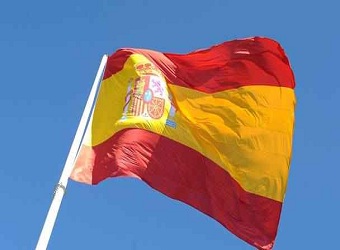Spanish authorities are giving separatists in Catalonia no option but to push ahead with declaring independence and proclaiming the region as a new republic, the region’s vice president asserted on Wednesday.
In an interview with The Associated Press, Vice President Oriol Junqueras said his party — one of two in the separatist coalition now governing Catalonia — rejected calling a snap regional election as a way out of the political deadlock because in its view Catalans already have chosen independence.
Spain’s Constitutional Court has ruled against the Oct. 1 referendum Catalonia’s government held after the court put the vote on hold. Central authorities say the results are invalid.
Junqueras said his party would “work toward building a republic because we understand that there is a democratic mandate to establish such a republic.”
The regional vice president insisted he was speaking only on behalf of his Republican Left party and not for the regional government. Catalan President Carles Puigdemont is set to address regional lawmakers during a parliamentary session beginning Thursday evening.
Junqueras spoke with the AP amid frantic jockeying within Catalonia’s ruling coalition and among its political allies on how to respond to plans by Spanish authorities to sack Puigdemont’s government and directly manage Catalonia’s affairs.
“We also understand that the Spanish government is giving us no other option than to defend the civil rights and citizens’ rights through the best tools that our institutions have,” Junqueras said.
Puigdemont has not signaled what he intends to do, but called a late Wednesday meeting of his cabinet. Local media speculated he could call a snap regional election to avoid the unprecedented takeover of the regional autonomy.
But Junqueras ruled an election out, saying it would be wrong and illogical “to renounce the democratic mandate that we have from citizens.”
In Madrid, Prime Minister Mariano Rajoy said his government’s plans to take control of Catalonia’s key affairs and halt the region’s push for independence were “exceptional” measures he hoped would not be needed for long.
The conservative prime minister told Parliament that invoking constitutional authority over Catalonia was the “only possible” way to bring the region back in line with Spanish law, which he said the separatist Catalan government has violated repeatedly.
Rajoy said he hopes the measures planned, which includes removing Catalan government officials — including Puigdemont and Junqueras — and curtailing the regional parliament’s powers, will be brief. They should end with a regional election he hopes to call soon, but only will be lifted once order is restored in Catalonia, the prime minister said.
Spain’s Senate, in Madrid, is expected to approve the measures on Friday. Catalan President Carles Puigdemont could address the Senate to argue against them, but has chosen to stay in Barcelona, officials from several regional parties said Wednesday.
Puigdemont instead plans to attend a session of the Catalan parliament in Barcelona, the region’s capital, beginning Thursday and ending Friday, the officials said. They spoke on condition of anonymity in keeping with internal party regulations.
Rajoy has asked the Senate to invoke a section of the Spain Constitution, Article 155, that allows the central government to step in when a region is found to be acting illegally. The action has never been taken before.
He argues it is needed now to stop the Catalan government from acting on the results of an outlawed Oct. 1 referendum that Puigdemont said gave him the mandate to declare independence.
“The government’s response is the only one possible, given the stance of the Catalan institutions,” Rajoy said. “I am fulfilling my duty and I am doing it in the face of a rejection of our laws, of our Constitution and of the millions of Catalan citizens who can see that their (regional) government has flouted the law.”
Rajoy said the aim of Article 155 is not to suspend Catalonia’s self-government but “to restore legality, boost the social co-existence that has been broken in Catalonia and tackle the economic consequences that its decisions are provoking.”
The uncertainty over Catalonia’s future could have an economic impact. Credit ratings agency DBRS warned on Wednesday that the situation is hurting the region’s economy and could become a drag on Spain’s economy.
The political turmoil brought by Catalonia’s standoff with the national government “is discouraging investment and tourism in the region,” DBRS said in a statement.
Junqueras, who is also in charge of the region’s economy, was confident in the Catalan economy and blamed the recent exodus of businesses on pressures from Spanish central authorities.
“There is no democracy that receives the attacks that we are receiving,” he said. “It is such an abnormal situation, with such great aggressiveness that is creating an unusual scenario in Europe.”
With Catalonia representing about one-fifth of Spain’s annual gross domestic product, any slowdown in the region would affect the national economy.
The Spanish government has revised downwards its growth forecast for 2018 to 2.3 percent from 2.6 percent, largely because of doubts over Catalonia’s future.
DBRS says the effects on the national economy will be “manageable,” however, unless the crisis becomes protracted.
Source: The Associated Press


